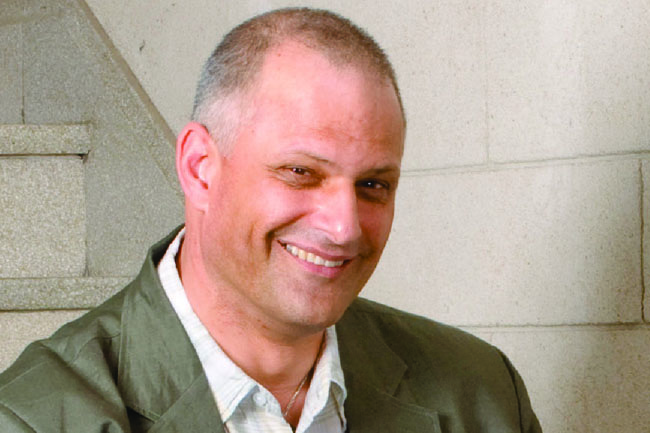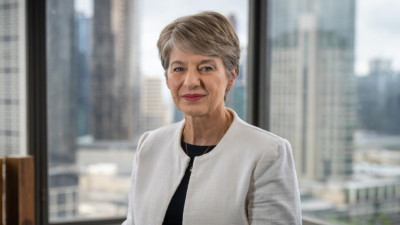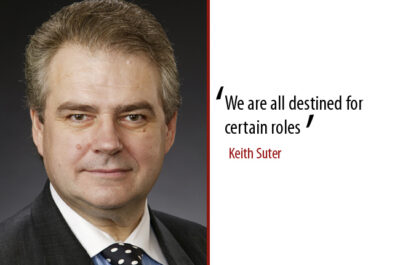Advice through the prism of a glass half full
Graham Rich … ‘quality financial advice adds material value’
Graham Rich considers it a compliment that his own investment biases are not well known. The founder of several businesses, including that which became Morningstar in Australia, has devoted much of his career to providing independent and objective information to the financial advice industry. He speaks with Greg Bright and reveals some of his personal investment preferences.
Graham Rich, the owner and publisher of PortfolioConstruction Forum, is approaching 40 years in the funds management advice industry. The key thing which has driven him during all that time, he says, is the firm belief that quality financial advice adds material value to individuals.
“Throughout my career, every piece of work that I’ve done has been an outworking of that belief… I am working as hard or harder now than I ever have and I’m enjoying it more.”
PortfolioConstruction Forum is now the only publication of the private company brillient!, which Rich and his wife Deirdre Keown set up after they left Morningstar in acrimonious circumstances in November 2001. He had launched the US brand-name research firm in Australia, changing the name of his former Australian and New Zealand research company, FPG Research, a little over two years earlier, in April 1999. The reason he readily remembers all the relevant dates is that what ensued was six years of litigation, which he eventually won with a $4 million settlement in his favour from Morningstar in 2007. If he is bitter, he doesn’t show it.
PortfolioConstruction Forum through its various events and publications, has become the major provider of information and views to 12,500 dealer group researchers and high-level investment advisers in Australia and New Zealand. These days the annual PortfolioConstruction Forum conference sells out to 500 delegates before he even produces the program.
“When I talk about quality advice,” he says, “the word ‘quality’ is obviously the key. The two core aspects of quality advice are: good information, knowledge and skill, which are fundamental; and a quality investment portfolio construction which includes the appropriate investments for the individual.”
Rich started brillient! in early 2002 after his dispute with Morningstar which centred on the firm’s growth path. Rich had sold the US firm on the plan to dominate the Australian advice industry for information, including unit pricing data, for which there were two other competitors at the time. But after the tech-wreck of 2000, Morningstar US, which had 50 per cent of the Australian business, did what US companies often do in times of uncertainty – it withdrew into its shell for a period. Battening down the hatches was not in Rich’s brief, he believes, and yet he was shown the door from his own company, without even a realistic offer for his shares. Independent valuations had the company worth about $20 million at the time. But, taking a step back reveals the roots of Rich’s business and investment beliefs.
He started his career at Norwich in New Zealand in 1975 after graduating with a degree in psychology. While he doesn’t advertise the fact, he later attended Harvard Business School. During the dead market after the OPEC oil price crisis of 1974 and ahead of the boom in financial services which was to follow market deregulation in the 1980s, the Australian arm of Norwich showed some foresight and started up a financial planning arm, which it called FPI. Rich, who had risen to head up the South Island distribution for Norwich in New Zealand, failed to convince his superiors to do likewise. So, he left in 1982 and set up his own financial planning company, FPG, which grew its own internal research arm, FPG Research.
“This was before Asgard and Assirt in Australia,” he says, “but three years later I sold the first financial planning business in NZ to concentrate on research. I always believed that you shouldn’t mix product with research. Research should be independent. So, the business looked to solely provide a range of information services to the burgeoning financial planning industry.”
One of the services was managed funds data, which is a thankless task that requires scale to make a living. Today, there are only two primary funds data providers in Australia, for instance – Morningstar and FundData, which is owned by IRESS, the software company. Tellingly, both were started by Rich. He and Keown developed a competitor to Morningstar Data in 2006, and subsequently sold this to IRESS.
But, going back again, Rich had started to eye expansion into Australia around 1990 when the data business of a firm called Independent Funds Research came onto the market. Rich wanted to buy both its Australian and New Zealand operations but could not afford the Australian leg, which was acquired by Perpetual.
Perpetual was a big client of the data firm and believed it couldn’t allow this to fall into the wrong hands. Rich approached the then senior executives in charge of the Perpetual trusts, Michael Migro (who went on to head up several funds management firms) and Connie Mckeage (who is now chief executive of OneVue) to try to obtain an option over the business. They shook hands on a vague promise to sell it to him down the track, which was honoured only a couple of years later. Rich had his Australian data arm.
Like a lot of self-made businessmen, Rich funded most of what he did from cashflow. It was not until 1996 that he was able to afford to move permanently to Australia and concentrate on the bigger opportunities. It was at this point that he introduced the notion of “fund ratings”.
“If there are two concepts or phrases that I am very pleased to have seen widely accepted and then popularized in Australia through our primary efforts, they are ‘fund ratings’ and ‘portfolio construction’,” he says. With the data business, in addition to Perpetual, he managed to get two early and important clients, Stephen van Eyk, of his namesake research house, and Barrie Lambert, the independent dealer group owner. In the ratings business, he had already managed to get several leading managers of the day to rate for his New Zealand business: Perpetual, BT, Rothschild and Macquarie. These ratings provided a starting set for Australia. Then, the first two managers to be rated by FPG in Australia just for Australia were MLC and Perennial, then a start-up sponsored by IOOF. Rich then did a deal with Fairfax to publish both unit prices and ratings in the Australian Financial Review, where Simon Hoyle, now the editor of Professional Planner magazine, was the funds management journalist at the time. He launched his ‘star’ ratings, in 1997, two years before Morningstar bought into the company.
The PortfolioConstruction Forum remains a unique concept in Australia. In 2002, the notion was not widely accepted as particularly important among financial advisors. Risk tended to be addressed only through asset allocation – more or less bonds – rather than through offsetting manager styles and greater diversification through the use of alternative strategies. PortfolioConstruction Forum initially concentrated on providing training programs and specialist information for about 100 researchers at the main dealer groups and subsequently expanded to include the full range of participants in retail funds management and advice in Australia and New Zealand. Now, consistent with the blurring of traditional lines and the expansion of advice services, a wide range of mezzanine and institutional participants also engage in PortfolioConstruction Forum programs.
The most important thing a financial advisor and his or her client need to do is ascertain their own investment philosophy, as much as a client can do that, Rich says.
“The advisor has a duty to give advice, not permission. It’s like a parent, who has a duty to teach values rather than specifics… The advisor needs to know what his or her own core beliefs are as well as the core beliefs of the licensee with which he works. They need to be aligned… Someone who just facilitates a transaction is not really an advisor.”
And the advisor needs to listen: “As my father used to say: ‘Graham, you have two ears and one mouth for a reason’.”
Apart from believing in the importance of quality advice, Rich is also a believer in the existence of manager skill and, often, the inefficiency of markets to enable demonstration of that skill.
He does not believe large firms are any better or worse than boutiques, although he acknowledges the greater difficulty that the weight of money will mean in adding value in some asset classes.
“I am sure that embedded in the really big managers, like BlackRock (the world’s largest fund manager), there are managers with exceptional skill. You have to sift out the gems and their capabilities within those big shops.”
He is not a fan of the argument that you should not invest in something you don’t fully understand. “There is no single person who understands how the first Apollo got to the moon or even my mobile phone. It’s more a case of me knowing when to cede decision making to others.”
Rich is optimistic about the future of the Australian advice industry. He says FoFA is introducing no more than practices which good advisors should have been adopting anyway.
“The role, relevance and future potential of quality financial advice has never been greater. The increasing demands of an ageing population and continuously challenging markets make for a great future for quality advisers.
“I’m a glass half-full kind of guy.”










